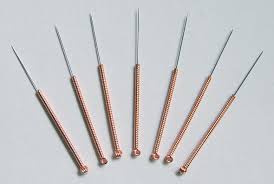What is acupuncture?

Acupuncture is based on the concept of qi, (pronounced chee) which means “energy” and it’s effect on how well the body functions. It can be beneficial to not only humans but canines as well.
During an acupuncture treatment session, needles, with or without microelectrical currents attached, are inserted at specific body locations along meridians of energy. The needles stimulate sensory nerve endings that send impulses up through the spinal cord to the different areas of the brain, causing both local and central acting effects. By stimulating these points, acupunturists seek to restore normal energy flow and in the process stimulate the body’s ability to heal itself. On the local level, the technique relieves muscle spasms and increases circulation. Systematically, it causes the release of different neurotransmitters and hormones throughout the body. The technique puts an animals energy back in balance whether they are treating the kidneys, liver, pancreas or arthritic conditions.
It is said to not be painful and the dogs normally don’t mind it, usually they will sit still for the procedure.
When the needle is inserted, it pushes tissue out of the way, causing little or no pain or discomfort. One of the reasons is, that the needle has specially designed fine wire needles that have no edges. The needle literally slips into holes that lead to the actual acupuncture point. When the needle reaches the correct depth, it may produce a feeling of pressure, a dull ache or pain relief. Pets can become so acclimated to the treatments that they will actually fall asleep during a procedure.
Occasionally, if a pet is overanxious they can usually calm the animal with the use of natural relaxants such as flower essences, homeopathics or herbs.
 How can acupuncture help your dog?
How can acupuncture help your dog?
Acupuncture can produce remarkable results. It can enhance the quality of life, and even extend it in some cases, when conventional medicine has nothing more to offer. Acupuncture can be used for serious, chronic internal problems such as liver and kidney failure and chronic colitis. It has produced results when conventional medicine’s sole option is putting the animal to sleep. Acupuncture can also help with nongenetic hearing loss that occurs in senior dogs. Fifty percent of the hearing can be restored with 4 to 10 treatments. Acupuncture can be used as a powerful tool for preventative health care and maintenance by boosting the immune system.
Acupuncture can often eliminate the need for surgery. For example, it is helpful for large dogs who develop anterior crucial problems. This is where one of the two ligaments that crosses the knee tears or partially tears. It is common for overweight or very active dogs. A sign of this type of injury is sudden limping on one hind leg. Surgery is typically used for this problem, however acupuncture can often substitute for surgery. It stops the pain and promotes healing. It can provide relief for musculoskeletal problems such as arthritis, disc disorders, lameness and stiff backs in senior dogs. It helps with certain neurological problems such as hindquarter weakness, partial paralysis and epilepsy. It can aid in gastrointestinal problems such as chronic vomiting and diarrhea. Acupuncture helps patients gain strength when surgery is needed is needed in high risk cases. After an operation, some animals will have lingering pain or discomfort at the site of surgery and may start chewing or licking the spot. Acupuncture can often stop this. After surgery involving the legs, animals will sometimes have trouble walking. Acupuncture can help restore full motion.
 How many treatments are needed?
How many treatments are needed?
Acupuncture sessions last anywhere from a few seconds up to an hour. Your pets condition and response determine the number and frequency of visits required. In general, the longer a problem has existed, and the more serious it is, the greater the number of treatments necessary. Some severe cases can respond dramatically to one treatment, while others that seem mild may require several treatments. Sometimes the results of a single treatment are long lasting. Other times a series of treatments is necessary for long lasting effects. No two cases are the same.
The Veterinarians Guide to Natural remedies For Dogs






